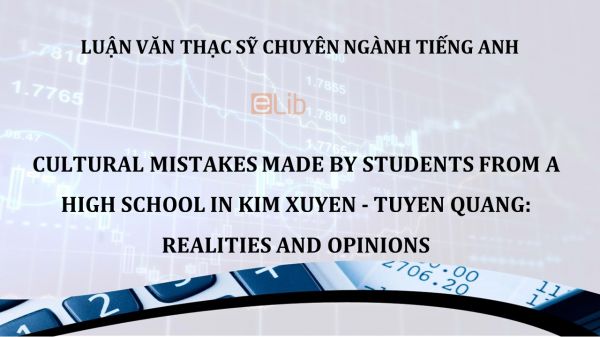MA-Thesis: Cultural mistakes made by students from a high school in Kim Xuyen - Tuyen Quang: Realities and opinions
MA-Thesis Cultural mistakes made by students from a high school in Kim Xuyen - Tuyen Quang: Realities and opinions aimed to find out some of the so-called cultural mistakes made by students in a high school in Kim Xuyen. It mainly explores the mistakes related to greetings, addressing the interlocutors, or responding to those acts. In order to achieve the objectives, the researcher uses both quantitative and qualitative research methods to collect the data: Questionnaires and Interviews
Mục lục nội dung

1. Preface
1.1 Rationale
Vietnam has been on the way of strong development and increased integration in all respects including the comprehensive and profound reform in education, especially in language teaching and learning. The active participation of Vietnam in regional and international associations and the recent adoption of market economy have stimulated the importance of English as an international language in the country (Le & Barnard, 2009). English language has attracted significant consideration from wide range of Vietnamese communities. Vietnamese government has stimulated a huge project of language teaching and learning called the National Foreign Language Projects with impressive determination to improve the English education in the nation wide scale till 2025
1.2 Aims of the study
Professor Hu Wenzhong (1999) thinks that the cultural mistakes is more serious than the language errors, because it is easy to cause emotional unpleasant between foreigners and Chinese. Therefore, how should we use language correctly and appropriately is an important part of the intercultural communicative competence
1.3 The research questions
What are common mistakes high school students make in initial turns of conversations?
What are the teachers’ and students’ opinions about whether those mistakes must be avoided in every context?
1.4 Scope of the study
This study focuses on investigating the mistakes occurring in the initial turns of conversations. As such, it mainly explores the mistakes related to greetings, addressing the interlocutors, or responding to those acts. Generally, initial turns can vividly reveal the impact of Vietnamese culture on the students’ performance of English. In this study, the researcher only concentrates on a group of students in a remote and mountainous area where there is a lack of a good English speaking environment. Thus, the findings might not be representative for all Vietnamese high school students
1.5 The significance of this study
Firstly, the study is conducted to find out some cultural mistakes which students have made when they communicate with foreigners. Hopefully, the findings of the study contribute theoretically and practically to the improvement of speaking process.
2. Content
2.1 Literature review
Definitions of Culture
The relationship between language and culture
Typical features of learning English in Vietnam
Language, culture and communication
Pragmatics and pragmatic competence
Intercultural Communication Competence
Cultural mistakes
Misunderstanding of culture mistakes
2.2 Research methodology
Quantitative method applied in the study
Qualitative method applied in the study
Research procedure
Setting of the study
Subjects of the study
Data collection instruments
Questionnaire
Observations
Structured interview
2.3 Findings and discussion
Data analysis
The results from interviews
Findings and discussion
3. Conclusion
This research was started on October 15th, 2018 and ended on May 25th, 2019 in a high school in Kim xuyen, Tuyen Quang. The research objective was to give ideas about cultural mistakes made for 150 students and compared with Dan' video (he is an English teacher who has taught English for a long time). From this study will help students at Kim Xuyen High School use their communication with foreigners, and the difference in behavioral culture between Vietnamese when using English delivered meeting with foreigners in Vietnam. Besides, it also shows Dan's views presented in the video are not correct
4. References
Anne Barron (2003). Acquisition in Interlanguage Pragmatics.
Becker, H., & Geer, B. (1957). Participant Observation and Interviewing: A comparison. Human organization, p.28-32.
Bernard, H. R., & Bernard, H. R. (2012). Social research methods: Qualitative and quantitative approaches. Sage.
Byram, M., Morgan, C. and Colleagues. (1994). Teaching and Learning Language and Culture. Great Britain: WBC.
-- Nhấn nút TẢI VỀ hoặc XEM ONLINE để tham khảo đầy đủ nội dung Luận văn ThS Tiếng anh trên--
Tham khảo thêm
- pdf MA-Thesis: An investigation into applying questioning techniques in teaching listening skills at the college of mechanics and metallurgy
- pdf MA-Thesis: Using task-based learning to improve english speaking performance of the 11th grade students at diem thuy upper secondary school an action research
- pdf MA-Thesis: Factors affecting grade 11 students' motivation in learning english at que vo 1 high school
- pdf MA-Thesis: Factors affecting grade eight students’ motivation in learning reading skills at dong hoa secondary school in thai binh city
- pdf MA-Thesis: An investigation on vocabulary learning strategies of non-major first year students of english at university of education – thai nguyen university
- pdf MA-Thesis: Applying the project-based learning (pbl) to english speaking skill enhancement for grade 10 students at cua ong high school, quang ninh province.
- pdf MA-Thesis: Developing high school students’ inferential reading skills
- pdf MA-Thesis: The explicit instruction about aspects of connected speech to the first year english major students’ perception and production at school of foreign languages – thai nguyên university
- pdf MA-Thesis: The use of group work to enhance speaking skill for students at tran phu high school
- pdf MA-Thesis: Using task-based reading activities to enhance vocabulary for freshmen at the college of mechanics and metallurgy
- pdf MA-Thesis: Using book club activities to enhance 10th form students’ english reading motivation at vcvb high shool
- pdf MA-Thesis: A study on techniques to teach english vocabulary to 4th grades at le van tam primary school
- pdf MA-Thesis: An application of drama in english project lessons in bac kan gifted high school
- pdf MA-Thesis: Implementing experiential activities in english teaching for 5 - 6 - year - old kids at dpa kindergarten
- pdf MA-Thesis: The influences of extra classes on students’ academic performance at que vo no. 1 high school in bac ninh province
- pdf MA-Thesis: An investigation into reading strategies used by efl students at high school
- pdf MA-Thesis: A study on using visual aids in english classrooms at some high schools in thai nguyen
- pdf MA-Thesis: The effectiveness of the first language discussion on english reading comprehension for 12th grade students in phu luong high school
- pdf MA-Thesis: An investigation into the usage of english teacher professional development through lesson study in lower secondary schools in thai nguyen city
- pdf MA-Thesis: A study on common gramatical errors in paragraph writing of non - english major students at hoa binh teacher’s training college
- pdf MA-Thesis: A study on mnemonic techniques to help students of grade 6 increase their vocabulary retention at a secondary school
- pdf MA-Thesis: Teaching grammar in context to improve speaking skills for pet candidates
- pdf MA-Thesis: A study on factors affecting english speaking skills of the 10th grade ethnic minority students at van hoa i high school
- pdf MA-Thesis: The roles of warming up activities in enhancing english speaking skills



